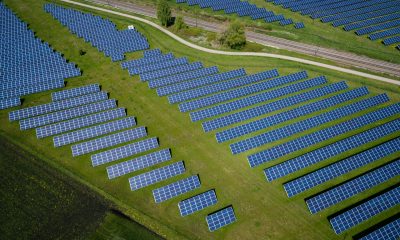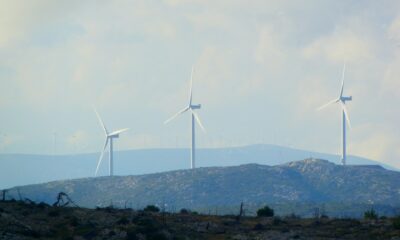Featured
AXA IM launches its first US High Yield low carbon fund
The fund will form part of AXA IM’s sustainable investment offering, a subset of the manager’s ACT range, and will be classified as Article 9 under the EU Sustainable Finance Disclosure Regulation (SFDR). It is currently registered and available to professional and retail investors in the UK, France, Austria, Belgium, Denmark, Finland, Germany, Italy, Liechtenstein, the Netherlands, Norway, Spain, Portugal, Sweden and Luxembourg.

AXA Investment Managers (AXA IM) announced the launch of the AXA WF US High Yield Low Carbon Bonds fund, demonstrating the firm’s commitment to delivering long-term sustainable value for clients while driving meaningful change for society and the environment.
The fund, in which ESG criteria are fully integrated, will use a sustainable investment approach to exclude many of the most carbon-intensive sectors, such as metals, mining and steel producers, utilities, and most energy sub-sectors. In addition, the ESG scoring of companies will be taken into account in the investment process.
As part of AXA IM’s ACT fund range, the fund adheres to AXA IM’s Sector Exclusion Policies and ESG Standards Policies, which include screening measures to minimize exposure to companies with low ESG scores. ESG analysis and key performance indicators (KPIs), including carbon intensity and water use scores, will form a key part of the investment decision-making process.
Read more about AXA IM US High Yield low carbon fund and find the most important financial news of the day with our companion app, Born2Invest.
The fund’s asset allocation will be based on a fundamental credit assessment and relative value analysis
Within the remaining investable universe, carbon and water intensity scores of emitters will be analyzed to avoid those companies that are considered excessively intensive in these two parameters. This contributes to the fund’s objective of having its carbon and water intensity at least 20% lower than that of the benchmark. The fund’s asset allocation will be based on a fundamental credit assessment and relative value analysis.
Within the overall portfolio, at least 90% of the companies will have an ESG score, at least 90% will have a carbon intensity score and at least 70% will have a water intensity score. The fund has the ability to invest in companies that we believe demonstrate credible plans to reduce carbon and water intensity in the future or offer products that help other companies improve their environmental footprint. AXA IM will also leverage its ESG engagement capabilities to encourage these companies to improve their environmental impact.
The fund will form part of AXA IM’s sustainable investment offering, a subset of the manager’s ACT range, and will be classified as Article 9 under the EU Sustainable Finance Disclosure Regulation (SFDR). It is currently registered and available to professional and retail investors in the UK, France, Austria, Belgium, Denmark, Finland, Germany, Italy, Liechtenstein, the Netherlands, Norway, Spain, Portugal, Sweden and Luxembourg.
Commenting on the launch, Carl “Pepper” Whitbeck, fund manager of AXA WF US High Yield Low Carbon Bonds, says: “At AXA IM, we believe that the global economy has entered a ‘decade of transition’ towards a more sustainable and decarbonized model. During this transition, we believe portfolios that aim to proactively reduce carbon intensity should be better positioned to withstand non-financial risks and outperform the broader market.”
“Carbon and water intensity are two widely followed ESG key performance indicators and are among the most important metrics to consider when analyzing the environmental impact of companies in the U.S. High Yield space. We view the AXA WF US High Yield Low Carbon Bonds fund as a traditional US High Yield strategy that can be easily compared to the broader benchmark, but with a significantly lower carbon footprint to help clients meet their ESG goals.”
“Amid the ongoing search for yield, the increased prevalence of ESG scoring for companies in the US High Yield universe in recent years has enabled the development of low-carbon US High Yield portfolios. In our experience, avoiding carbon-intensive issuers is beneficial in terms of both total return and volatility, making the new fund a strong addition to our existing US High Yield offering.”
__
(Featured image by marcinjozwiak via Pixabay)
DISCLAIMER: This article was written by a third party contributor and does not reflect the opinion of Born2Invest, its management, staff or its associates. Please review our disclaimer for more information.
This article may include forward-looking statements. These forward-looking statements generally are identified by the words “believe,” “project,” “estimate,” “become,” “plan,” “will,” and similar expressions. These forward-looking statements involve known and unknown risks as well as uncertainties, including those discussed in the following cautionary statements and elsewhere in this article and on this site. Although the Company may believe that its expectations are based on reasonable assumptions, the actual results that the Company may achieve may differ materially from any forward-looking statements, which reflect the opinions of the management of the Company only as of the date hereof. Additionally, please make sure to read these important disclosures.
First published in elAsesorFinanciero, a third-party contributor translated and adapted the article from the original. In case of discrepancy, the original will prevail.
Although we made reasonable efforts to provide accurate translations, some parts may be incorrect. Born2Invest assumes no responsibility for errors, omissions or ambiguities in the translations provided on this website. Any person or entity relying on translated content does so at their own risk. Born2Invest is not responsible for losses caused by such reliance on the accuracy or reliability of translated information. If you wish to report an error or inaccuracy in the translation, we encourage you to contact us.

-

 Cannabis5 days ago
Cannabis5 days agoSouth Africa Proposes Liberal Cannabis Regulations with Expungement for Past Convictions
-

 Biotech2 weeks ago
Biotech2 weeks agoVolatile Outlook for Enlivex Therapeutics as Investors Await Clinical Catalysts
-

 Crypto2 hours ago
Crypto2 hours agoCrypto Markets Under Pressure as Vitalik Buterin Sells 17,000 ETH
-

 Markets1 week ago
Markets1 week agoWeather-Driven Supply Outlook Lifts Coffee Markets in Brazil and Vietnam
























